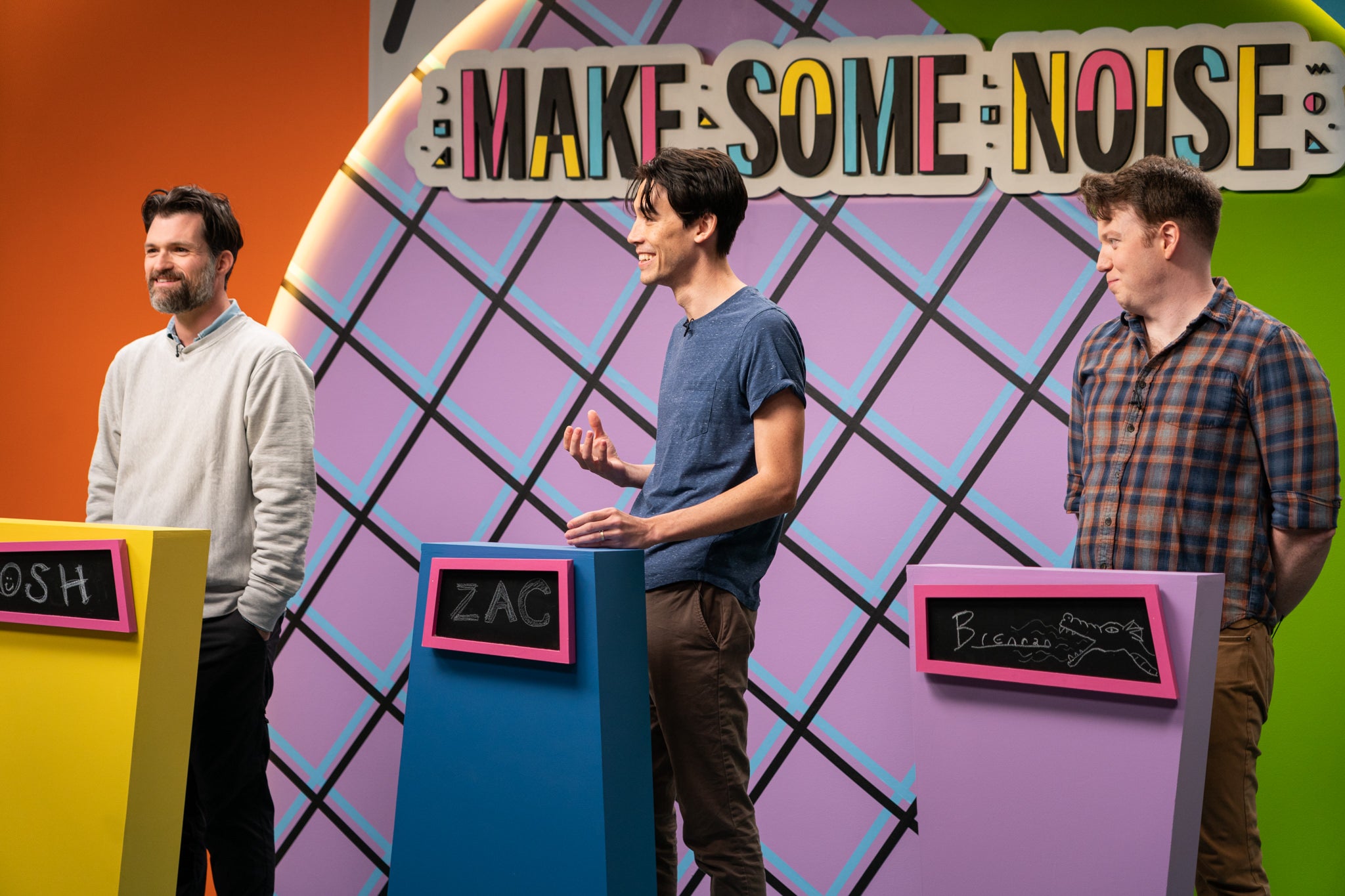The best streaming service is run by comedy nerds, not corporate giants
The huge streaming services often seem more interested in bumping a stock price than they are in creating a compelling product, thinks Ryan Coogan. Meanwhile, the small guys are doing a much better job


Back in 2013 I signed up to Netflix so that I could watch the long-awaited fourth season of Arrested Development. My original plan was to binge the whole thing in one day while my seven-day free trial was still active, then cancel my subscription, absconding into the night like a cat burglar who only steals disappointing sitcom revivals.
I ended up keeping my subscription active because, like most people, Netflix was the first streaming service I’d ever used, and I was amazed that it offered what felt like unlimited content for a relatively small monthly fee. You won’t believe this, but back then Netflix still carried movies that were worth watching, instead of producing an endless parade of identical Christmas-themed romantic comedies and acting as a graveyard for prematurely-cancelled tv shows.
Flash forward nine years and I’m signed up to virtually every streaming service that currently exists and is available in the UK. Amazon Prime, Disney +, Bravo TV Deluxe, Quibi – each a cornucopia of mediocre third-party content and hit-and-miss original programming that I spend more time aimlessly scrolling through than I do actually watching.
Except one.
My favourite streaming service is an absolute goldmine of completely original content, made by some of the funniest and most creative entertainers working today. The fact that it not only exists but has also somehow managed to thrive in a market that includes media giants like Disney and Warner Brothers, is a testament to the fact that the streaming model doesn’t have to be exclusively the domain of huge companies who often seem more interested in bumping a stock price than in creating a compelling product.
It’s called Dropout, and the story of its inception is honestly more compelling than a lot of Netflix originals. The service is the modern iteration of what originally began life as CollegeHumor, a comedy website created in 1999 by high school friends Josh Abramson and Ricky Van Veen, with help from web developer Jake Lodwick. The site mostly acted as a forum for funny essays, viral images, and low-budget sketch comedy videos.

CollegeHumor was one of a rash of comedy websites that thrived in the noughties and early 2010s, similar to sites like “Cracked” and “Funny or Die”, where up-and-coming comedians, writers and actors were given the freedom to create content that would appeal to an audience of millennial students and comedy nerds. CollegeHumour, in particular, stood out from the crowd during its early years due to the high quality of its video content, and the calibre of its on-screen talent and personnel.
Many of the site’s alumni have gone on to have distinguished careers in film and television, and in some cases have even launched comedy empires of their own. Streeter Seidell has worked as a writer for Saturday Night Live since 2014, where he has had a hand in creating a number of the show’s most iconic skits, including Tom Hanks’ famous “David S Pumpkins” sketch. Sarah Schneider was a co-head writer at SNL, before creating the award-winning HBO Max series The Other Two with co-writer Chris Kelly. Josh Ruben went on to direct the critically acclaimed comedy-horror films Scare Me and Werewolves Within. Jake Hurwitz and Amir Blumenfeld, of the pseudonymous viral CollegeHumour series Jake and Amir, now run the comedy podcast and video network HeadGum. There are more — too many to list — but you get the idea. CollegeHumour was a magnet for a level of comedy talent comparable to that of The National Lampoon, or the early Simpsons writers’ room.
CollegeHumor’s decision to be more ‘safe in its presentation was also likely spurred on by the site’s increasing reliance on the ad revenue
However, over time the content of the site began to change. The most notable difference is that it shifted its focus from both written and video content to a model that was almost entirely video-based. Their sketches also changed in tone, graduating from the edgy – and sometimes controversial – form of humour that was popular in the mid-2000s, to a more socially conscious product that placed more of a focus on politics and world events. The pivot made sense; it’s difficult to sell a brand of comedy based on partying, gross-out humour and hooking up with girls to an increasingly politically aware millennial audience.
However, CollegeHumor’s decision to be more “safe” in its presentation was also likely spurred on by the site’s increasing reliance on the ad revenue generated by its content’s presence on third-party platforms, as more and more of its content began to be viewed on YouTube and Facebook. In 2019, Facebook was forced to settle for $40m in a class-action lawsuit where the social media giant was accused of inflating its video metrics by up to 900 per cent in order to encourage content creators to partner with the company. In October of that year, former CollegeHumor cast member Adam Conover tweeted:
“My former employer CollegeHumor did this. In order to beat YouTube, Facebook faked incredible viewership numbers, so CH pivoted to FB. So did Funny or Die, many others. The result: A once-thriving online comedy industry was decimated. A $40m fine is laughable; shut Facebook down.”

Conover’s words would end up being prescient, as CollegeHumor in its original form would fold just months later. However, it did not go down without a fight. Seeing the writing on the wall, in 2018 the higher-ups at CollegeHumor founded Dropout: a subscription video service created at the urging of the site’s parent company, in an effort to deliver a business model that would drastically increase revenue. While the service did generate profit at an impressive rate, it did not do so quickly enough for the site’s investors, who put the site up for sale in 2019.
After a string of layoffs, the company’s assets were purchased by Chief Creative Officer Sam Reich, whose tenure with the company stretched back to the early days of CollegeHumor and who was a popular presence both on- and off-screen as he tried to keep the site alive and save as many jobs as possible. While he was only able to operate Dropout with a skeleton crew – including one member of full-time creative staff in improv comedy savant, Brennan Lee Mulligan – and was immediately forced to navigate the effects of Covid on the site’s production efforts, Dropout has since thrived due to Reich’s commitment to producing quality programming for the site’s devoted fanbase.
Dropout’s flagship show is Dimension 20, an actual-play tabletop roleplaying series primarily hosted by Mulligan. Each season of Dimension 20 follows a rotating cast of CollegeHumor alumni and improv comics, as they play around in a world guided by a narrative crafted by Mulligan or one of the show’s guest hosts. The series uses Dungeons and Dragons and other roleplaying mechanics to determine how stories play out, often leading to situations that the cast could not possibly prepare for. This often leads to scenarios which are compelling not despite their narrative randomness, but because of it, as each decision and dice roll shapes the wider story.
The relative success of Dropout is a testament to the fact that there is still a place for creatives under so-called late-capitalism
However seasons of Dimension 20 are limited to between six and 20 episodes, forcing the host to guide players down a set path to a specific time limit, while also compensating for their ability to radically alter the story’s direction with an unexpected character choice. Mulligan compares the process of hosting to the martial art of aikido, where energy is absorbed and redirected to both his own and the player’s advantage.
A common thread with most of Dropout’s programming is that it’s entirely improvised, which is pretty appropriate considering the way that the service came to be in the first place. In a Twitter thread posted on the four-year anniversary of Dropout, Sam Reich said that:
“Visionary companies are supposed to have a 3, 5, and 10 year plans. But enough rug pulls over the years has made us wary of such arrogance […] Our ‘plan,’ if you can call it that, is to continue to take risks on shows that appeal to us, then use our successes to inform and invest in more risks, and never risk too much.”

In a world where you’re competing with streaming giants like Netflix and Hulu, or tech giants like Facebook and Amazon, you have to be adaptive in order to survive. But it’s an adaptability that benefits creators, who instead of having to tailor their content to an algorithm created by some profit-driven corporation which wants to optimise content to help satisfy advertisers, are tailoring it to a fanbase that is only there in the first place because it appreciates what they make. CollegeHumor was a popular website, sure, but it wasn’t Disney. Dropout didn’t have the brand recognition to coast on its archive of Jake and Amir videos forever. The platform lives or dies on the fact that people are happy to show up for a product that they can’t access anywhere else. More than that, it lives or dies on the fact that its content is good enough that people are willing to pay for it.
It’s what maked Dropout’s reliance on improv-driven content so impressive. Like in live improv, every joke, every choice, is a wager with the audience that if they stick around, they’ll be entertained. It says: we might not have props, or a script, and you might not know who we are, but if you trust us, we’ll prove that we have the skill to pull this off. And with the right crowd, on the right day, we can do something that could only have happened under that specific set of circumstances, and that you’ll never see anywhere else. You can’t manufacture that. You can’t expect it to happen because you threw a lot of money at it. You just have to do it.
The relative success of Dropout is a testament to the fact that there is still a place for creatives under so-called late-capitalism. I’m not talking about content creators who try to satisfy trends generated by the errant clicks of toddlers whose parents threw them down the YouTube rabbit hole so they could treat themselves to an hour’s peace. I’m not talking about those genuine creatives who get roped into making a third Marvel movie knowing full well it’ll be hacked apart by a committee of people who think Citizen Kane should be more “toyetic.” I’m talking about those people who are driven by a genuine desire to entertain, to educate, to write, to direct, and to just generally do the thing that makes them feel like they’re making a positive contribution to society in a culture that increasingly tells them the only way to do that is by learning to code.
It sometimes feels as though we’re moving further and further away from a world that values creativity as anything other than a commodity that can be controlled by the same five or six companies that make our electronics and toilet paper. But that isn’t true. Not yet. You can’t monopolise joy, or laughter, or the feeling of finding something that really speaks to you.




Join our commenting forum
Join thought-provoking conversations, follow other Independent readers and see their replies
Comments